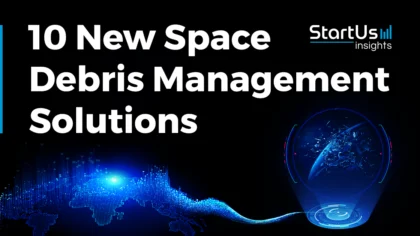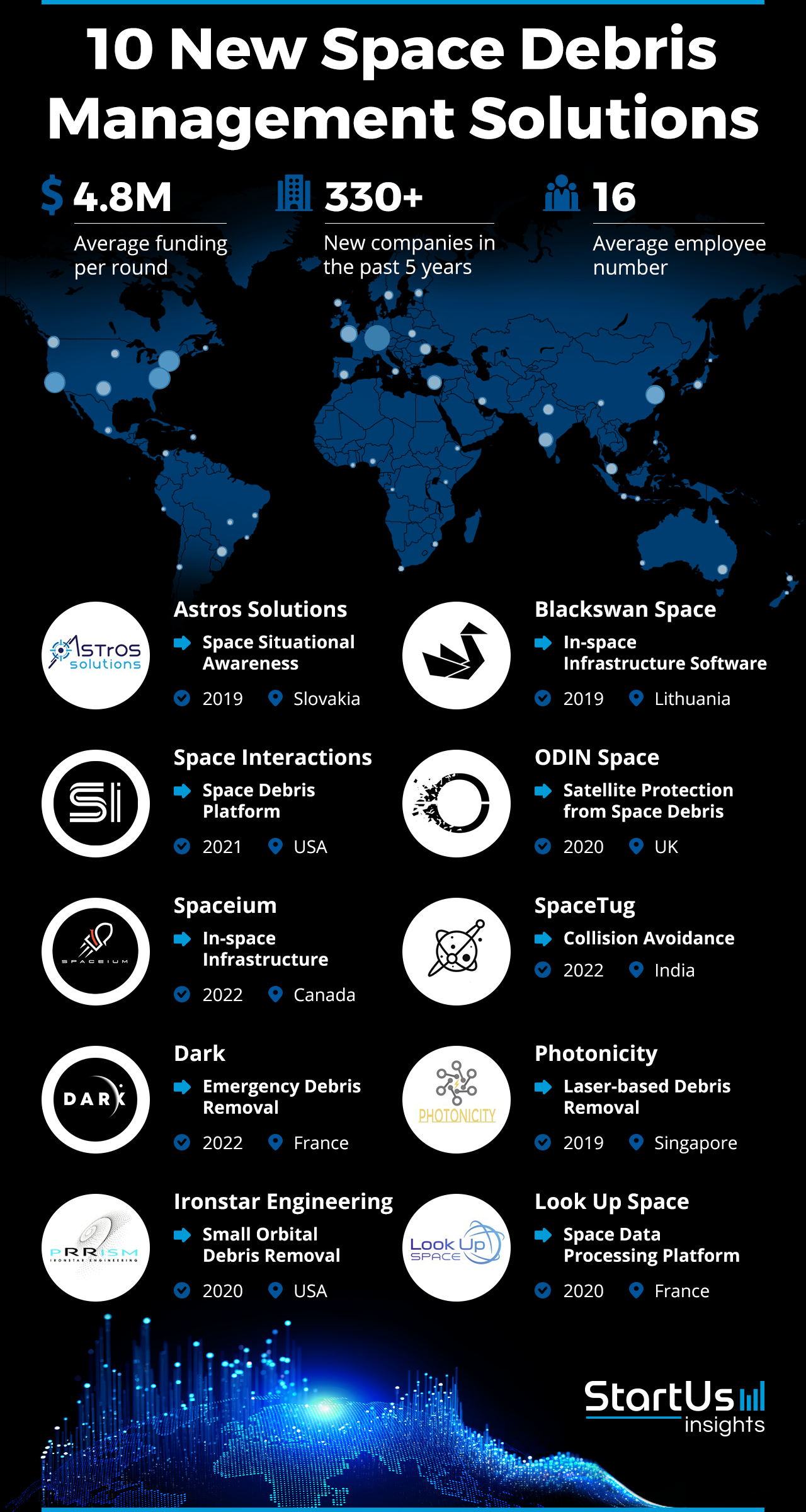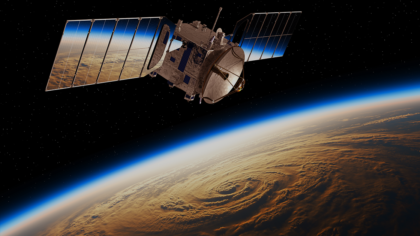This article provides an overview of 10 emerging companies advancing space debris management. These companies offer new space debris management solutions such as in-space infrastructures, space debris platforms, space situational awareness (SSA), and small orbital debris removal. This article details their contributions, showcasing the expanding scope of solutions in this vital industry. We updated this report 5 days ago. Missing information? Contact us to add your insights.
Continue reading to gain up-to-date and data-driven insights on:
- Profiles of 10 Emerging Space Debris Management Companies
- How to Scout Top Space Debris Management Solutions Easily
Key Takeaways
Drawing insights from the Big Data & AI-powered StartUs Insights Discovery Platform that provides data on over 4.7+ million emerging companies globally, we explore the evolving landscape of the space debris management market. This sector is marked by key trends and a substantial workforce, shaping its future. Here are some key insights at a glance:
- Current Space Debris Management Trends: Some of the major trends impacting the space debris management industry are automated collision avoidance systems, advanced satellite tracking, active debris removal missions, CubeSats for debris monitoring as well as harpoon and net capture technologies.
- Space Debris Management Market Stats: The sector comprises 4.1K+ organizations worldwide. Out of these, 330+ new space debris management companies were founded in the last five years, witnessing 2020 as the average founding year. On average, each of these companies employs about 16 people. Moreover, the average funding received by space debris management companies per round in the same span is USD 4.8 million.
- 10 New Space Debris Management Solutions to Watch:
- Astros Solutions – Space Situational Awareness
- Space Interactions – Space Debris Platform
- Spaceium – In-space Infrastructure
- Dark – Emergency Debris Removal
- Ironstar Engineering – Small Orbital Debris Removal
- Blackswan Space – In-space Infrastructure Software
- ODIN Space – Satellite Protection from Space Debris
- SpaceTug – Collision Avoidance
- Photonicity – Laser-based Debris Removal
- Look Up Space – Space Data Processing Platform
Discover 10 out of 330+ Emerging Space Debris Management Solutions
In this section, we spotlight 10 new companies offering solutions like small orbital debris removal, in-space infrastructure software, satellite protection from space debris, collision-free space, remote applications from Earth to space, and more. These entities leverage advanced algorithms, sensor technologies, and AI-driven techniques to enhance data accuracy, operational efficiency, and space safety. Read on to explore many more innovative solutions that these companies offer!
Note on Signal Strength
One of the unique metrics we feature for each company is Signal Strength, a proprietary data point generated by our Discovery Platform. It gauges the extent to which a company’s influence has permeated the global ecosystem of startups, scaleups, and emerging companies. This proprietary metric serves as a valuable guidepost for understanding a company’s standing in the broader market landscape.
1. Astros Solutions
- Founding Year: 2019
- Employee Range: 2-10
- Location: Slovakia
- Signal Strength: Medium
- What they do: Astros Solutions provides space situational awareness and space traffic management (STM) for long-term space sustainability. Its Astros–1A sensor tracks space objects and validates sensor performance. The company’s AMOSReentry project uses a global network of cameras to validate re-entry models with optical observations. The firm’s platform integrates ground-based data acquisition of satellites, space debris, and near-earth asteroids to improve space safety.
2. Space Interactions
- Founding Year: 2021
- Employee Range: 2-10
- Location: USA
- Signal Strength: Strong
- What they do: Space Interactions combines AI with digital twins for space traffic management. The company’s platform, SI Forerunner, creates real-time virtual replicas of satellites and objects in space to provide tracking and coordination. It visualizes publicly cataloged objects in Earth’s orbit to support education and experimentation. The platform also addresses the threat of orbital debris, which includes non-functional spacecraft and fragmentation debris traveling at high speeds. Satellite operators, space agencies, and researchers focused on space traffic management use this platform.
3. Spaceium
- Founding Year: 2022
- Employee Range: 2-10
- Location: Canada
- Signal Strength: Very Strong
- What they do: Spaceium develops modular service stations in space to support interplanetary missions. Its Debris Hub solution offers dedicated storage for space debris and platforms for in-orbit recycling. This facilitates the collection, storage, and recycling of orbital debris, reducing collision risks. The company’s Space Mechanics platform further enables repairs and part swaps for spacecraft. Lastly, Spaceium’s charging hub delivers a dependable power supply in space, reducing lift-off weight and extending mission duration.
4. Dark
- Founding Year: 2022
- Employee Range: 11-50
- Location: France
- Signal Strength: Very Strong
- What they do: Dark offers space security solutions through its Interceptor platform. This platform performs unplanned space security missions, including emergency debris removal and in-orbit inspections. The company removes large objects responsible for dangerous re-entries and debris proliferation. This enables quick response times and cost-effective solutions in mitigating collision risks for space agencies and operators.
5. Ironstar Engineering
- Founding Year: 2020
- Employee Range: 0-1
- Location: USA
- Signal Strength: Medium Strong
- What they do: Ironstar Engineering provides PRRISM, a platform for space debris management. It redirects solar plasma through the polar cusps to remove orbital debris. This platform controls plasma flow by creating intercept solutions with debris in low Earth orbit (LEO) and increasing pressure to remove debris from orbit. PRRISM remains outside the debris field to ensure safety and efficiency and allows space agencies, satellite operators, and space mission planners to improve the long-term sustainability of space operations.
6. Blackswan Space
- Founding Year: 2019
- Employee Range: 2-10
- Location: Lithuania
- Signal Strength: Very Strong
- What they do: Blackswan Space uses its advanced autonomy platform for space debris management. The platform’s Mission Design Simulator provides a digital twin for real-time mission simulations and synthetic data generation. Its vision-based navigation (VBN) tool enables autonomous navigation while AI/ML algorithms allow satellites to perform complex maneuvers. The Robohands software solution facilitates debris removal, in-orbit servicing, assembly, and manufacturing.
7. ODIN Space
- Founding Year: 2020
- Employee Range: 2-10
- Location: UK
- Signal Strength: Very Strong
- What they do: ODIN Space develops a platform that uses on-orbit sensors to map and analyze lethal, non-trackable debris smaller than one centimeter. These sensors provide real-time risk insights and collision risk assessments to satellite operators, insurers, and investors. The platform offers detailed debris characterization, including size, speed, and trajectory. It integrates with existing satellite systems to provide lightweight and low-power sensors. This solution mitigates the risks associated with space debris in low Earth orbit and geostationary equatorial orbit (GEO).
8. SpaceTug
- Founding Year: 2022
- Employee Range: 2-10
- Location: India
- Signal Strength: Weak
- What they do: SpaceTug builds robotic manipulators, dragsails, and on-orbit servicing tools to remove or repurpose space junk. Its vision-based navigation system enables precise maneuvers for rendezvous, proximity operations, and docking. The company’s collision avoidance system further enhances satellite safety by predicting and preventing potential collisions. Additionally, the navigation system supports advanced modeling and simulation capabilities by integrating orbital mechanics and machine learning. Satellite operators use this to ensure the sustainability and safety of their space assets.
9. Photonicity
- Founding Year: 2019
- Employee Range: 2-10
- Location: Singapore
- Signal Strength: Very Strong
- What they do: Photonicity leverages high-power laser technology for space debris management and clean energy distribution. The company’s platform combines adaptive and space optics to deliver precise, wireless energy to satellites and lunar rovers. Its laser-based debris removal system targets small-sized debris to mitigate space clutter and improve the safety of space missions.
10. Look Up Space
- Founding Year: 2020
- Employee Range: 11-50
- Location: France
- Signal Strength: Very Strong
- What they do: Look Up Space provides space safety and security by addressing the risks associated with space congestion, debris proliferation, and orbital threats. Its high-performance ground-based radar solution, SORASYS, provides centimeter-class object detection and tracking. The company’s SYNAPSE platform processes space safety data to support civil and defense applications. Further, the company’s global sensor network enables real-time space object tracking, offering precise detection regardless of weather or visibility conditions. This benefits governments, institutions, agencies, and commercial entities relying on space infrastructure.
Quick Tip to Find New Space Debris Management Solutions
Utilizing a SaaS platform like the Discovery Platform for identifying new space debris management solutions provides significant benefits compared to traditional scouting methods:
- Increased Efficiency: The Discovery Platform offers advanced tools that streamline the scouting process. It replaces your hours of conventional desk research, saving time and resources in identifying space debris management innovations.
- Access to Real-time Insights: Gain a competitive edge with up-to-date information on the latest trends in the space debris management sector. The platform keeps you informed with near real-time updates on emerging space debris management companies and news, enabling you to make swift and informed decisions.
- Precise Scouting: Customize your search to focus on specific niches within the space debris management sector, such as laser-based debris removal, data processing platforms, or in-space infrastructure software. The platform’s diverse filtering options allow you to target your scouting efforts precisely, ensuring that you find the most relevant and groundbreaking companies in the field.
Ready to Explore All New Space Debris Management Solutions?
We’ve explored the dynamic landscape of the space debris management industry, examining the latest trends and spotlighting exceptional companies driving innovation. To dive deeper, download our free SpaceTech Report or schedule a demo of the Discovery Platform for a customized exploration of these groundbreaking developments. Interested in contributing your expertise on startups and tech? We’d love to hear from you.











